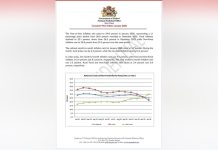Africa-Press – Malawi. Malawi imports volume reduced by 44 percent between January and October 2022, a situation economic experts have attributed to forex scarcity. The National Statistical Office (NSO) indicates that during the period, the country’s imports volume were recorded at $1.4 billion, 44 percent lower than the $2.5 billion imports volume recorded during the same period last year.
The figures further show that exports reached $750.3 million, representing an eight percent decline when compared to $818.7 million in the same period last year.
This means that the country’s trade balance improved to -$607.2 million in the first 10 months of 2022 from $1.7 billion, representing a 64 percent change.
In an interview, international trade economist Murry Siyasiya said the development was partially good in that the country has started responding by reducing imports though not by constraints.
“This is rather a situational condition than an intended condition from good policies. It is just that we have had challenges with foreign exchange. So, if we have no Forex, we can’t import. That’s what is explaining the decline in imports.
“It is the same with the decline in exports, though it’s about 8 percent compared to last year, but most of the goods that we export also rely on raw materials we purchased from outside Malawi. So if we are importing less, we are likely going to export less,” Siyasiya said.
However, he was quick to say that the appetite is still there and the impact may not translate into economic growth as the trade balance remains negative.
In a separate interview, Malawi university of Business and Applied Sciences-based economist Betchani Tchereni said the situation suggests that the country can have import substitution and manage to protect its meager foreign exchange reserves.
“The economy performed badly, hence the decline in the importation of goods and services. We do not produce much of our own; we depend on imports. People didn’t import much, which may imply that the welfare of the people suffered,” Tchereni said.
Another economist Thomson Kumwenda said that forex reserves were in the past supported by RBM financial derivative structures and also donor support for various projects and initiatives.
“The delays in the conclusion on the International Monetary Fund Extended Credit Facility, suspension of the RBM Exchange Rate Management Derivative Programme in account of debt sustainability issues essentially had put a lot of pressure on the country forex reserve management frontier and made worse by our insatiable demand for imported goods and services.
“This has affected the economy in many ways; erratic fuel supply, delay in commercial fertiliser imports which will pressure the farming community and inadvertently affect the forex reserve projections for the coming quarters and also gross domestic product growth projections,” Kumwenda said. He added that the outlook, factoring in the inflow of donor aid and expected budget support points to increased imports again.
“Banks are sitting with a lot of foreign exchange invoices and instruction letters just pending availability of foreign exchange. Again, this will tighten liquidity in the banking sector on a projected basis and certainly cause the cost of funds to go up as banks will be dealing with efficient allocation of capital,” Kumwenda added.
According to the NSO figures, 2022 trends in imports have been declining from $181.4 million in January to $86.2 million in October. However, export figures show an upward trajectory showing exports at $77.2 million in January against $120.6 million in September which slightly dropped to $100.8 million in October.
For More News And Analysis About Malawi Follow Africa-Press






